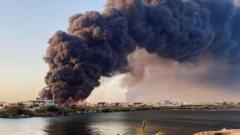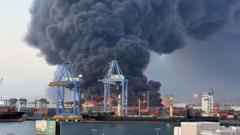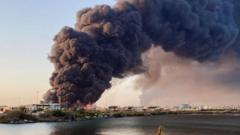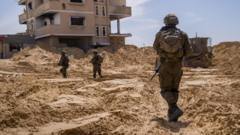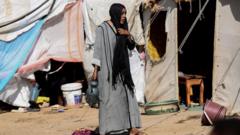As Sudan's army claims victory over the RSF, Khartoum lies in ruins, embodying both loss and resilience. Amidst destruction, citizens celebrate Eid while confronting uncertainty about the future.
Khartoum's Destruction: A Glimpse of Resilience Amidst Chaos
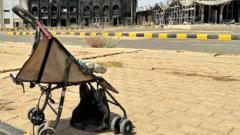
Khartoum's Destruction: A Glimpse of Resilience Amidst Chaos
The aftermath of Sudan's war reveals a city in ruins yet filled with emerging hope as residents grapple with their new reality.
The once-vibrant city of Khartoum has been left in silence and destruction after weeks of fierce urban warfare. Following the army's recent recapture of the capital from the paramilitary Rapid Support Forces (RSF), the aftermath echoes the toll of a six-month battle tied to an enduring two-year civil conflict, estimated to have taken 150,000 lives. The scenery is stark; Khartoum, formerly a bustling commercial and governmental hub, now resembles a charred wasteland.
In an early exploration of the royal palace, previously seized by the RSF, the floors were strewn with debris, and the remnants of grand furnishings stood dust-covered amidst looted spaces where even electrical wiring had been stripped bare. A soldier expressed his relief and pride in reclaiming such a significant site for Sudan, which carries immense symbolic weight for the military.
As Eid festivities ripple through the beleaguered city, soldiers celebrate, heralded as heroes, yet the devastation of Khartoum is staggering—government buildings and businesses stand scorched and emptied, while the international airport is left with wrecked aircraft and smoldering debris. The streets tell haunting tales of violence, littered with unexploded ordnance and remains, including a chilling stop near St Matthew's Cathedral, a sanctuary that has somehow largely escaped the worst of the destruction.
In an unusual juxtaposition of despair and hope, the population slowly begins to emerge from the shadows, uniting to mark the first Eid celebration in two years. As food becomes scarce during these challenging times, resilient voices like that of Duaa Tariq, a pro-democracy activist, speak of newfound freedom and the emotional lightness brought about by the end of RSF control.
Despite continued reports of atrocities and a lingering fear for the future, optimism prevails among some residents. Elderly voices express hope for reconstruction efforts, while younger generations grapple with trauma and uncertainty. The ongoing specter of conflict hints that while celebrations erupt today, the complexities of a next chapter weigh heavily on the minds of Khartoum’s citizens. As one 16-year-old mournfully noted, the war's focus may yet shift back to the western regions, compounding the humanitarian crisis. The resilient spirit of Khartoum shines through the ruins, but the shadow of its past continues to loom large.







